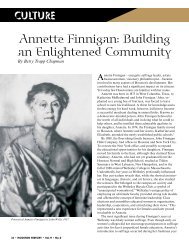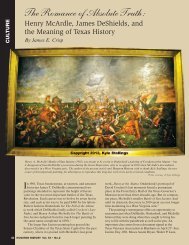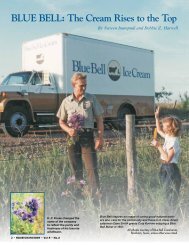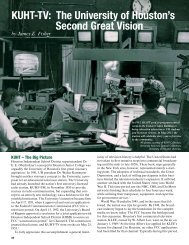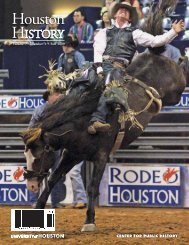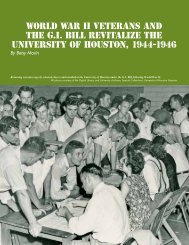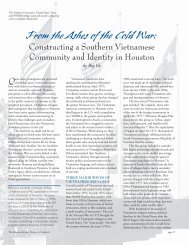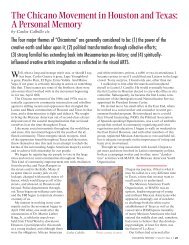You also want an ePaper? Increase the reach of your titles
YUMPU automatically turns print PDFs into web optimized ePapers that Google loves.
all the time. And then, I spent my last year with St. Louis and Iheard Jack Buck quite a bit because I was damaged goods whenI went, and I only pitched thirty some innings for them, andI did not go on all the trips because I was on the disabled list.So, I got to hear Jack Buck a lot. I think those two guys wereprobably, in terms of just baseball announcers, the best that theNational League had to offer.I worked with Dewayne Staats and Gene Elston about thefirst half and then Milo Hamilton and Bill Brown the secondhalf, roughly. I probably had a little closer relationship with theplayers when I first started announcing because I was just inmy thirties. I was the same age as a lot of the players, and I hadplayed with or against them. And so, it was almost like I wasstill a player, but then as I grew older and the players got younger,and there was nobody that I had played against or with, youknow, then I had a separate relationship, which was more justa professional thing, you know — talked to them, interviewedthem, say hello on the bus or around the batting cage but not goout and have a beer or go play golf or anything. It separated as Igot older.I got to get in the race as an announcer and then I got toget in the race as a manager. I was never in it as a player. ThatPhiladelphia series [in 1980] was probably more exciting thanthe Mets series [in 1986]. I got to do both of those. I had Nolan’s4,000 th strikeout. I was doing play-by-play on radio at that time.[While announcing] I did a lot more statistical analysis, andI read more books from people like Bill James and others thatkind of broke the game down analytically in ways that I had notthought about before. So by the time I went down to manage, Ithink I had a better idea of what creates runs scored, more thanthe fielding. The pitching was something I knew from experience,and I knew from experience that the better fielders youhave, the better pitcher you are going to be. So, that was theprevent-runs standpoint and that was mostly from experience.But the offensive part was less familiar to me—slugging average,on base average, the percentage ofsteals and what percentage you have todo to gain an advantage, and the numberof the percentage of games where the biginning wins the game. And then, I wentthrough my scorebook to see if that wastrue; so I went through a whole year,and about 50% of the time, you know,the winning team scored more in oneinning. Even if it was a 2-1 game, theyscored the two runs in one inning. Andthen, I took it a step farther and said,well, how many times does a team scoreas many runs in one inning as the otherteam does in a whole game, and it was70%. So, when I went down to manage,I was armed with those ideas, and a lotof managers are not. You know, a lotof managers still think about the teamthat scores first wins 60% or 70% ofthe time. But, you know, the team thatscores first could score five runs in thefirst inning and still score more than theother team does in the whole game. So,both of those things could happen in the10 Vol. 6, No. 3–Sportssame game. But a lot of managers bunt and play little ball in theearly part of the game to try to get the first run because they haveheard that the team that scores first wins. I never did that whenI managed. I tried to play for the big inning until the end of thegame when we only needed one run.Managing the game was fun, but managing the situation wasnot fun. It was probably the job that I least enjoyed of all thethings I have done in baseball, just because of the combinationof having to get there so early because the players get there soearly and have nothing to do until the game starts except talk tothe media. And then, the media kind of pressure in the seasonwhere we had a bad year and even in the seasons where we lostin the playoffs. By the time it was over at first, you know, it [beingremoved as manager] kind of hurt my feelings because wehad won the division that year; but after about one month, I feltlike I had had a big burden taken off of me, and I realized that Icould be a lot happier person if I did not have to be responsiblefor what happened out on the field. But actual tactics, from thefirst pitch to the last pitch, I enjoyed that.I had great players. Oh, I mean, that is critical. You can screwup a good team if you make everybody mad and you are a badmanager, but you cannot possibly take a team of middling talentand win a championship through the shrewdness of your tactics.I probably emphasized defense, pitching, and fielding morethan most managers for that reason. I think in the Big Bang era,most managers, coming from playing positions rather than frompitching, they think a little more about how are we going tooutscore the other team, and I would probably think how are wegoing to allow fewer runs than the other team? And I probablywas less reluctant to go into extra innings to shoot for the moon,change pitchers in the fifth inning to try to have a big inning. Iwas kind of a save-your-ammunition type manager, not reallyreacting too much to what was going on early in the game unlessyou just absolutely had to. But if it was a close game, evenif we were a little behind, I would say, “Let’s save our best pinchThe Astros made the playoffs four of the five seasons Dierker managed the team, and he waselected Manager of the Year in 1998.




